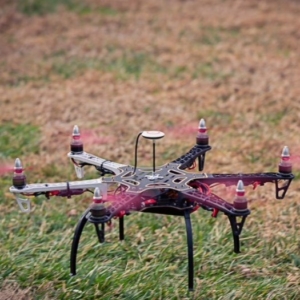Recent SOU computer science grad protecting clients against drone attacks
It all sounds very cloak-and-dagger, but Austin Shadel sees it more as an extension of his longstanding interest in drones and robotics, and his academic focus on computer science over the past five years at Southern Oregon University. Shadel graduated in June and went to work as a software engineer at Citadel Defense Company – an industry leader in counter unmanned aerial systems (cUAS) that serves clients in the defense, government and business communities.
“The fact that the company was involved in the drone space attracted me,” Shadel said. “The company is only about 30 of us, so it’s a very small, close team – you end up working with everyone in some way.”

A drone that Austin Shadel designed in high school
Citadel helps customers in 13 countries manage the potential and real threats posed by unmanned aerial systems – drones. Its standalone and integrated counter-drone products address safety, security and privacy concerns, using artificial intelligence and machine learning algorithms to autonomously detect, track and “neutralize” drone threats.
A news story distributed nationwide when Citadel was acquired earlier this month by leading national security contractor BlueHalo described the cUAS company’s products as “technologies critical to the warfighter.”
“When defending against drone swarms and difficult-to-detect threats, Citadel’s AI/ML-powered systems allow operators to identify and terminate enemy UAS threats with unmatched speed, accuracy and reliability,” said the story, distributed by the news service Business Wire.
“Citadel’s industry-leading solutions create a distinct operational advantage for servicemen and servicewomen on the front lines.”
Shadel sees his position as primarily technical, but the protection of clients’ property – and lives – is the company’s top concern. He said the new relationship with BlueHalo will expand Citadel’s capabilities and resources, and will benefit military and intelligence customers.
“The company will continue to provide automated and AI-powered counter-drone solutions to keep servicemen and servicewomen protected from the rapidly growing threat of weaponized drones and swarms,” he said. “Our software development team will continue to build paradigm-shifting solutions and integrate new capabilities that provide protection beyond the cUAS mission.”
Shadel, 24, graduated from SOU in June with a bachelor’s degree in computer science. He grew up in the San Diego area – where he recently returned to work at Citadel – and then chose to attend college at SOU because he wanted to experience a different environment while pursuing his passion for robotics, drones and coding.
“Ashland is a very pretty area and I was excited to go to school somewhere where I could experience seasons, as in San Diego it always feels like it’s summer,” he said. “Computer science had always been an academic focus of mine since high school. I pursued computer science-related activities in high school, such as being on the robotics team and taking all the engineering courses I could.
“I’ve been interested in robotics and coding in general since early high school. I used to build drones from parts I’d buy at hobby stores and go out flying them with a friend. At one point I was 3D printing drone frames for fun. I enjoyed the process of designing, building and watching something I built work.”
Shadel said his capstone courses were his favorites, and his best memories from five years at SOU were of the friends he made and the study sessions they held together for their computer science courses. The problem-solving skills and flexibility he learned at SOU have prepared him for the ever-changing demands of his new position.
“A lot of my duties and responsibilities are centered around assuring the reliability of the (counter-drone) system, so this involves extensive testing and bug-hunting on any new or existing feature,” he said. “Mixed in with this, also, is the designing of new features to meet what customers are asking for directly.
“Often times in a start-up-type environment you have to wear a lot of different hats to get the job done. So being comfortable being out of your comfort zone and being willing to learn quickly is a must-have in my opinion, for these types of situations.”



